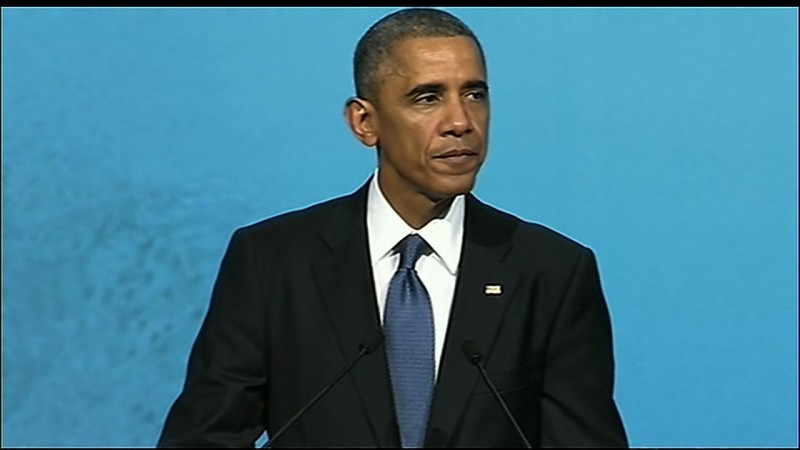President Barack Obama is set to close a week jam-packed with news of a breakthrough with Cuba and new tensions with North Korea on Friday with a 1:30 p.m. EST news conference.
Just weeks removed from huge Democratic losses in the midterm elections, Obama’s allies say he appears liberated — taking executive actions to overhaul immigration rules, thaw the United States’ economic and diplomatic freeze with Cuba and more.
Here are some of the questions Obama will likely face as he confronts the press one more time before he heads to Hawaii for what’s left of 2014:
Did November’s election result liberate you?
A President derided as overly cautious for much of the last six years — especially since the Republican wave of 2010 — is suddenly no longer hesitant to use every lever the Oval Office has to offer. He’s brokered a diplomatic breakthrough with Cuba, halted deportations for more than 4 million undocumented workers, green-lit Environmental Protection Agency restrictions on ozone emissions, endorsed net neutrality and extended talks with Iran to curtail its nuclear program. And that’s just been in the first six weeks since Democrats lost the Senate.
With no more potential election results weighing on his actions, does Obama suddenly feel like he’s free to be the President he’s always wanted to be?
Republicans scoff at this notion — and they’re working quickly to curb Obama’s executive authority. Dozens of states are challenging his immigration action in court, while Congress is plotting to defund him on immigration and block parts of his Cuba deal. The strength of Obama’s resistance on Capitol Hill won’t come fully into view until new lawmakers take office in January.
Was this the push Cuba needed to embrace democracy?
Republicans like Florida Sen. Marco Rubio blasted Obama’s deal to free American contractor Alan Gross, trade three Cuban spies for one American spy imprisoned in Cuba and ease a host of U.S. banking and travel restrictions and open an embassy in Havana in exchange for the release of 53 political prisoners and expanded Internet access.
Their criticism: Obama just gave away the United States’ best leverage to force Cuba to abandon communism and embrace human rights, democracy and a greater connection to the outside world. He responded by pointing out those tactics hadn’t worked in the 50 years since the embargo.
What was Obama’s calculation on what this deal would mean for Cuba’s future?
What’s the next campaign pledge you’ll use your executive authority to fulfill?
Obama was widely mocked during the 2008 campaign for promising to engage directly, without preconditions, with the leaders of the United States’ enemies. And yet his Cuba deal, negotiated in secret for more than a year, shows Obama carrying through on that promise.
Obama has just two years left in office to tackle a long list of complicated issues that played prominent roles in his 2008 and 2012 campaigns. Will he finally close Guantanamo Bay? Will his approach to the international stage change now that election results aren’t riding on how his moves are portrayed?
Russia’s economy is tanking, but Vladimir Putin isn’t backing down. What’s next?
Russia’s ruble has tumbled to historic lows, and its central bank raised its interest rate to a stunning 17 percent this week — a downturn due to dropping oil prices and harsh Western sanctions on the country’s oligarchs and its banking, energy and defense industries imposed as a result of the country’s annexation of Ukraine’s Crimea region.
So Russian President Vladimir Putin could have sent signals that he is willing to back off. Instead, he used a three-hour long news conference Thursday to compare Russia to a “bear” that the United States and its European allies are trying to chain down before ripping out its “teeth and claws.”
Obama and his top economic advisers have long insisted that the pressure of Western sanctions will grow over time — and there’s only so much Russia’s economy can take. But Putin continues to resist that characterization. Is a breaking point coming soon? And if not, what will the United States and European countries do to further pressure Putin?
What does North Korea’s Sony hack — and Sony’s decision to pull a film’s release as a result — say about America?
The Obama administration is set to place the blame on North Korea for hacking into Sony’s computers and threatening attacks on theaters that show “The Interview,” a movie that depicts the cartoonish assassination of North Korean leader Kim Jong Un. Sony subsequently decided to halt the film’s planned release.
Obama could be asked whether Sony was wrong to pull the movie — and whether it’s troubling that a major company was so easily cowed.
He could also face questions about whether there’s the Sony hack will build momentum in Congress for cybersecurity legislation that would increase data sharing between companies and the U.S. government.
Other similar questions: Is Sony’s vulnerability an ominous sign for other corporate giants, the government, financial services institutions and more? Are cyber attacks akin to acts of violence? What can the United States do to better defend itself against future attacks?
